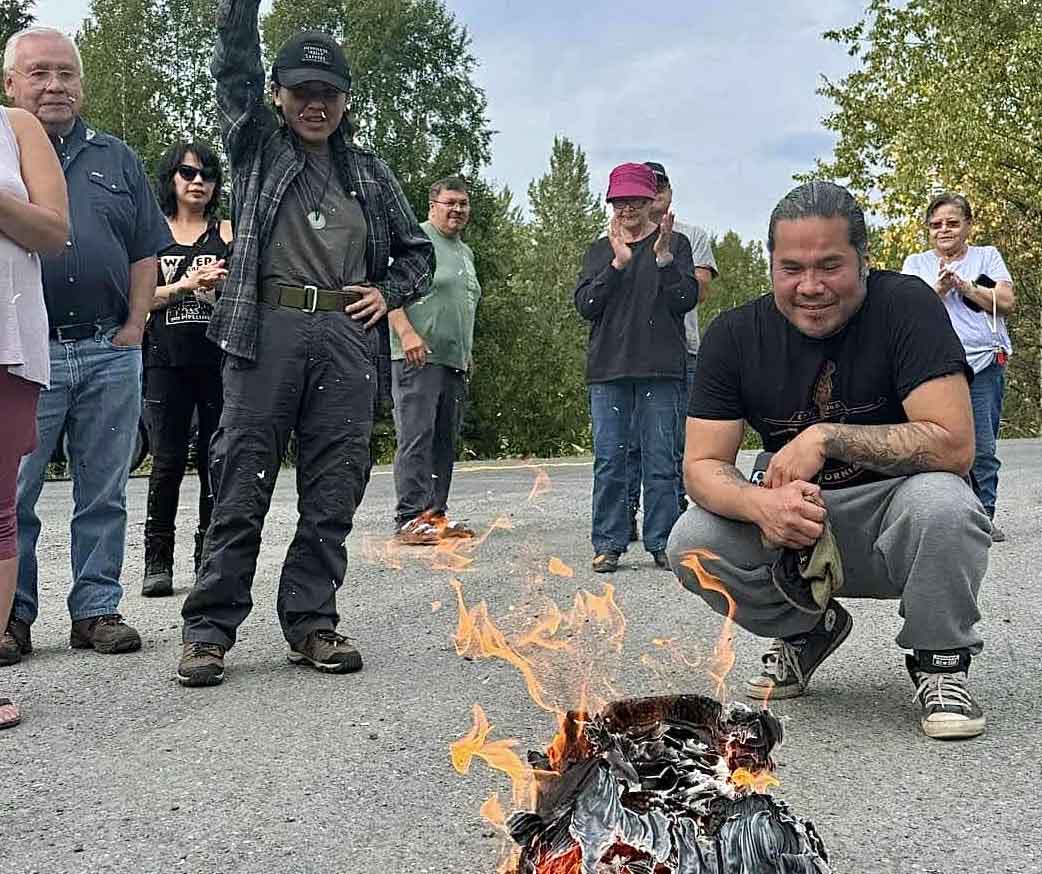Following months of efforts by the Gitanyow Hereditary Chiefs (GHC) to engage in meaningful consultation on the significant changes to the Prince Rupert Gas Transmission (PRGT) pipeline and the failure to consult Gitanyow regarding the newly proposed Ksi Lisims LNG terminal, the GHC have taken action on the ground to protect the Lax’yip (territory).
Wilp Watakhayetsxw issued a public statement via social media that the Cranberry Connector or Nass Forest Service Road is closed to LNG trucks carrying construction equipment and materials. This closure is only within the Gitanyow Lax’yip portion of the Forest Service Road, and does not affect other road users.
Construction notice of the PRGT pipeline provided by the BC Energy Regulator and the BC Environmental Assessment Office was only for activity in the Nisga’a treaty settlement lands and no consultation was carried out for the use of the Cranberry Connector in the Gitanyow Lax’yip. The GHC also held a burning ceremony at the site on the Cranberry Connector. On August 22, 2024, the Hereditary Chiefs and allied Gitksan Wilp members burned copies of the 10-year agreement with PRGT.
Beginning in the fall of 2023, Gitanyow began communicating to PRGT that the agreement was out of date and did not reflect the same project, the environmental conditions, and the legal landscape that was the context for the 2015 agreement.
Gitanyow has requested on numerous occasions to dissolve the agreement. PRGT has rejected these requests but has acknowledged that the agreement is out-of-date and that the company would like to make amendments.
Much has changed in the last decade. Since the project was proposed over ten years ago, new information about climate change and the severe impacts of LNG development is available, and both federal and provincial governments have since fully endorsed the United Nations Declaration on the Rights of Indigenous Peoples (UNDRIP).
The PRGT pipeline is now proposed to connect to a new terminal, which has not yet been reviewed or approved. The Ksi Lisims terminal would be located in the Nass River estuary, and to date scientific studies to verify the impact on salmon have not been completed.
Gitanyow has also reviewed the climate impacts associated with the PRGT and the Ksi Lisims project. Both the fisheries and climate reviews found that there was insufficient evidence to substantiate the proponent’s claims that the project could achieve net zero goals in terms of greenhouse gas emissions and the provincial government’s assertion that the project would have no impact on Nass River fisheries.
Despite the Chiefs’ concerns and supporting scientific evidence, their objections have been ignored. PRGT is hastening construction to preempt the expiration of its Environmental Assessment Certificate on November 25, 2024.
This rash decision has left Gitanyow with little recourse but to defend the Lax’yip from heavy industrial traffic through a sensitive fish and wildlife corridor. The GHC are also motivated and inspired by recent Gitksan and Gitanyow youth efforts to share concerns regarding PRGT and Ksi Lisims at a forum held on August 19, 2024, in Gitanmaax, attended by approximately 300 people.
Quotes:
Simogyet Watakhayetsxw/Deborah Good stated:
“It is my right and my duty to defend the territory. We have heard the voices of the youth and their concern for their future. We are acting in our Ayookxw to protect our Lax’yip, and to protect future generations’ right to access healthy land, water, fish and wildlife. In our language, we call this Gwelx ye’enst. ”
Simogyet Gamlakyeltxw/Wilhelm Marsden emphasized:
“Our ancestors protected our Lax’yip for thousands of years, and it is now our duty to do the same for future generations. We have a responsibility to safeguard the health of our lands and waters. Salmon is the lifeblood of our people and the PRGT pipeline threatens our food security, our culture, and our survival in an already rapidly changing climate.”
Naxginkw/Tara Marsden, Wilp Sustainability Director for the Gitanyow Hereditary Chiefs stated:
“Governments must recognize the need for transparent, evidence-based decision-making and reject out-of-date agreements that do not reflect the climate crisis we are currently facing and the advances we have collectively made in adopting the United Nations Declaration on the Rights of Indigenous Peoples.”
